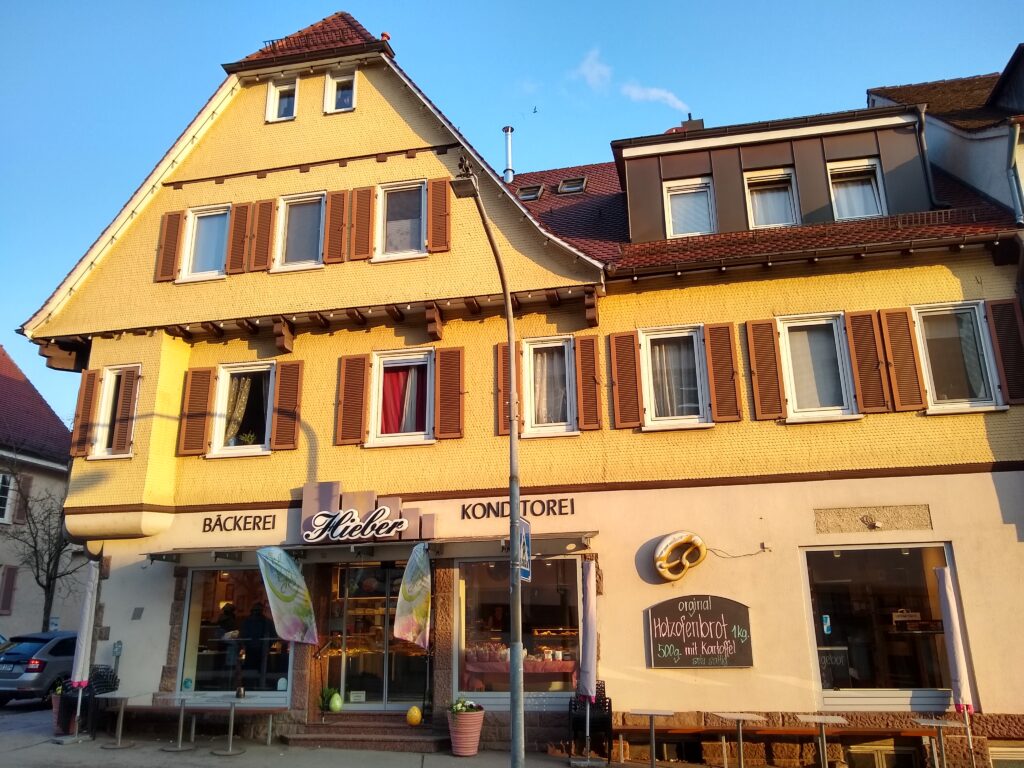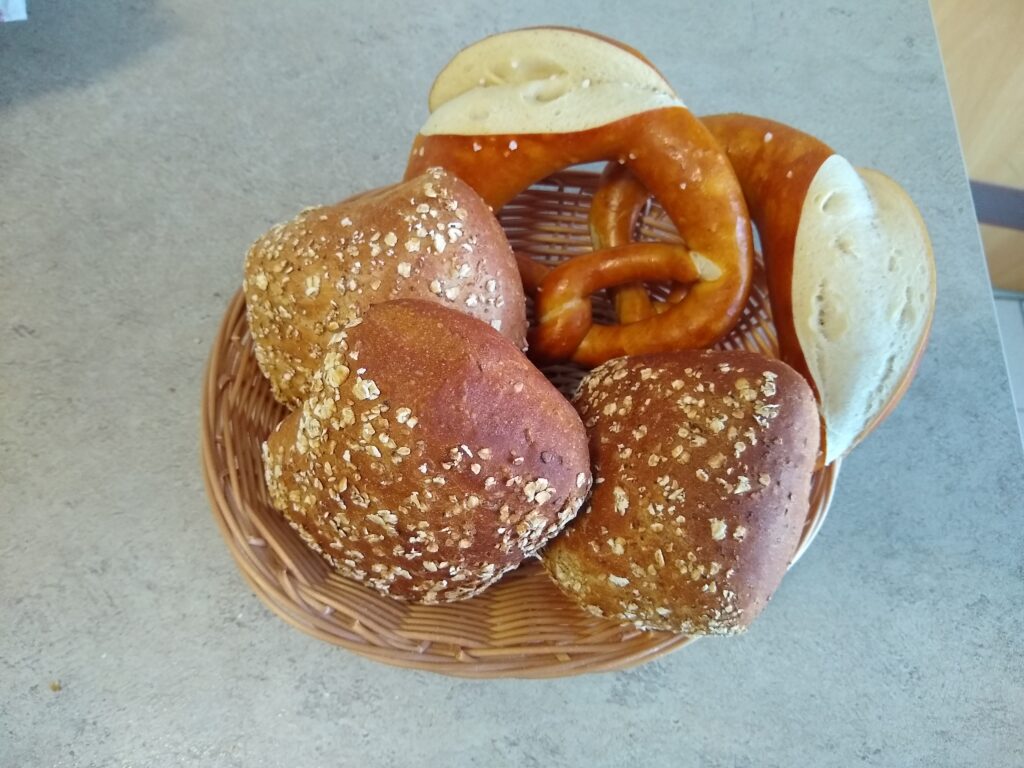
7:45 on an almost-spring morning in a small town in Southern Germany. It’s still chilly enough that I need my fingerless gloves, but the sun is rising in a clear sky, setting the golden stucco of the old bakery at the street corner aglow with the promise of a beautiful day. The upper two stories of the old building look hardly different from how they’ve been for the last century or so, the window shutters beneath the half-hipped red tile roof folded back against the wall to show net-curtain-shrouded windows behind which the inhabitants are starting their day.
But the ground-floor shop windows are as modern as they come. I step through the automatic sliding glass doors into the warm scent of the fresh-baked breads and rolls and pastries that are piled on the shelves against the back wall and displayed behind the glass counter that runs the whole length of the shop.
On the far left, at a small café table a couple of men in business suits down a quick cup of coffee and a roll on their way to catch the train for work. The baker emerges from the back room with an enormous tray piled with fresh pretzels, which he unceremoniously dumps on the counter. Good! Those are just what I’m after. This is Swabia, the original birthplace of the pretzel, and nowhere else are they as good as here. A few salt kernels – not too many – speckle the deep, glossy, mahagony brown of the fat part with the deep slash exposing its creamy interior; the two little twisted arms are thin and crispy. Legend has it they are modelled on the first pretzel baker’s wife’s crossed arms as she watched him bake.
When I turn back to the counter to place my order, I find that two small girls are in line ahead of me, buying a sausage roll, a bread roll, and a couple of pastries for their breaktime snack at school – they’re probably in Grade 1 or 2, no more. “That’ll be €3.40,” the sales lady says as she hands over the paper bag with their goodies, and one of the girls stretches as high as she can to lay her coins on the little wooden tray that sits on top of the glass counter for the purpose. She can barely reach, but she pushes the coins across, grabs her bag, and with a cheerful “Tschüss!” she and her friend skip away. They should still make it in time for school to start at 8:00.
It’s my turn. I can’t be bothered to make a lot of decisions today, choosing from the dozen or more varieties of fresh, crispy bread rolls – white, brown, rye, plain, seeded, sunflower and pumpkin, long or plump or round – so I just ask for three of my favourites, Dinkelbrötchen or spelt rolls: a crispy crust covered in oat flakes, a tender interior with soft chewy spelt kernels throughout. Perfect for a spread of Quark, soft white cheese, topped with strawberry jam. And I ask for two Brezeln, of course.

Their warmth is seeping through the paper bag as I step back out into the street. I’m tempted to hug it to myself to warm my hands, but in true European fashion I tuck it into my backpack to carry it the two blocks to where I’m going. The golden hands of the clock tower show five minutes to eight as the drugstore around the corner and the supermarket down the street are getting ready to open their doors to customers. A new day is beginning in this small town.

The bakery has been operating in that building for more than four generations. For over a hundred years, children have been stretching to put their coins on the counter to buy a bread roll for recess, then run off to get to school before the bell rings at 8:00; working people bought their coffee and pastry and headed for the train; and folks like myself today with a little time to spare bought fresh, still-warm-from-oven rolls and pretzels to take home for a leisurely breakfast of coffee and bread and cheese and jam. The baker has been up since 3:00am to make it all happen, as did his father and grandfather and great-grandfather before him, and perhaps his daughter and granddaughter will do after him. For all the automatic sliding doors and gleaming plate glass display windows, there is a thread of continuity that runs through the fabric of existence here.
I find my soul being nourished by the warmth that gently seeps out of my bag of Brötchen und Brezeln, and I revel in that sense of being tied into a web of culture that has been in place for generations and will continue for generations to come. It’s unlikely that any children and grandchildren of mine will buy breads and cakes in this place where my grandparents and great-grandparents got theirs, but someone’s children will. The thought is as warm as the rolls and pretzels in my bag.
Life, the Universe, and a visit to the German bakery. I’m bringing breakfast today.